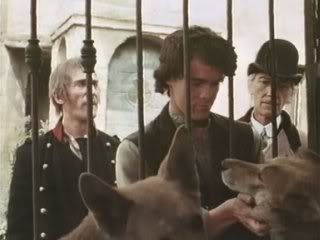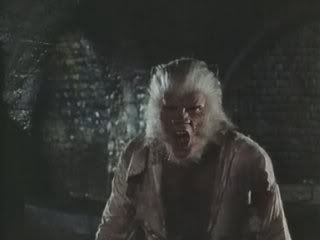Is he a man or animal? It'll be for you to judge.


The full moon isn't until tomorrow night, but tomorrow also happens to be Edgar Allan Poe's birthday and since he didn't have the foresight to write a werewolf story (which, if he had, would surely have been made into a film by now, probably several times over), this month's Full Moon Feature will just have to be a day early. And my lycanthropic tale of choice is 1975's Legend of the Werewolf, for which I have Jon Kitley to thank since he's the one who provided me with a copy of this hard-to-find gem. Not sure what the holdup is (if Earl Owensby's rancid Wolfman can find a home on DVD, then so can this film, damn it), but I consider it to be the missing link between The Curse of the Werewolf and the werewolf cycle of the early '80s, and as such, it deserves to have a higher profile.
Not only does Legend of the Werewolf have the feel of an old-school Hammer film (the period setting, decent production values on a limited budget, the emphasis on sex and blood), it was even made by a number of Hammer vets, from director Freddie Francis and screenwriter Anthony Hinds (using his usual pseudonym, John Elder) to star Peter Cushing and supporting player Michael Ripper (who also appeared in The Curse of the Werewolf). It was even inspired by the same novel that Curse was based on -- Guy Endore's The Werewolf of Paris -- but it's no mere retread. Rather, Hinds used some of the story elements that hadn't made it into the previous version and even moved the setting back to Paris (which doesn't prevent most of the cast from speaking in British accents, but there's nothing unusual about that).
Cushing gets top billing, but he doesn't appear until the story is well underway. Instead, the film opens with an orphaned baby being adopted by a pack of wolves and growing into a feral child who is taken in by professional swindler Hugh Griffith, who makes the wolf boy the star attraction in his decidedly low-rent traveling show. Eventually the boy grows up to be a strapping young lad (David Rintoul) who transforms into a hairy beast under the full moon one night and, after making his first kill, hightails it to the city whereupon he immediately lands a job as assistant to grubby, raspy-voiced zookeeper Ron Moody. He also promptly falls in love with prostitute Lynn Dalby, who tries to keep her profession a secret from him with predictable results. Meanwhile, forward-thinking police surgeon Cushing takes an interest when bodies start showing up at the morgue with their throats torn out and investigates the attacks on his own initiative, despite being warned off the case by inspector Stefan Gryff (one of the few actors who even attempts a French accent). As for Ripper, he's one of Rintoul's victims, who's so unfortunate I don't even think he gets to be discovered by the police.
Since this film predates The Howling and An American Werewolf in London by half a decade its makeup and transformation effects aren't groundbreaking in any way, but the werewolf does have a great look that holds up well even at the end of the film when the camera settles down and holds on him long enough for us to really study it. And speaking of the ending, this may very well be the first werewolf film on record where the fully transformed creature is still able to speak and be reasoned with. I know there are a number that have come out since where that is the case, but it's nice to see a werewolf on film that isn't entirely bestial, that hasn't completely lost touch with its humanity.